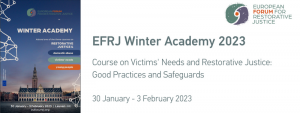European Forum for Restorative Justice is launching its first in person Winter Academy on restorative justice, which will take place between 30 January – 3 February 2023. One of the courses – “Victims’ Needs and Restorative Justice: Good Practices and Safeguards” – is addressing, among others, victim support professionals.
The EFRJ Winter Academy creates a new international learning opportunity for those interested in restorative justice and its high-quality applications in different contexts. It includes three parallel practice-oriented courses led by experienced trainers. These courses invite participants to develop and strengthen their skills, get a hands-on experience of good practices, to get challenged by complex questions, and inspired by innovative and nuanced methods.
The course “Victims’ Needs and Restorative Justice: Good Practices and Safeguards” will develop the skills of professionals working in direct contact with victims of crime or supporting the practical implementation of victims’ rights. Participants will better understand how restorative justice responds to the (justice, safety, and other) needs of victims and will help to make a better offer/assessment/referral of victims for restorative justice services.
The course focuses on the challenges and opportunities of restorative justice from the victims’ perspective, looking at the different steps that may ensure access to high-quality restorative justice for victims. The course will focus on the needs of victims, the awareness of criminal justice professionals and the general public on restorative justice, the resistance and fears towards its use (especially in specific type of crimes and/or vulnerable groups), the inter-agency cooperation needed to support referrals and access to the services, the methodologies in place to offer restorative justice to victims (and responsible for the harm), the actual facilitation of the dialogical process, the follow-up of the (potential) agreement, and the evaluation of the overall service.
Aim of the course “Victims’ Needs and Restorative Justice: Good Practices and Safeguards”
To understand better the victims’ needs and experience in the restorative justice process and to clarify the actual implementation of restorative justice programmes (from the referral procedure to the offer to the actual delivery of the service) in order to support access to restorative justice services for all victims of crime. After the course, participants should be able to inform the victims better and to adapt their practices/service to more efficiently meet victims’ needs.
Learning outcomes
- To understand values, principles and practices of restorative justice;
- To identify victims’ needs and to understand how restorative justice takes into consideration these needs;
- To clarify the role of different professionals in ensuring access to restorative justice for victims (and responsible of the harm);
- To understand the challenges and opportunities of referring victims to restorative justice services.
Who should participate?
This course is meant for all professionals working with and for victims of crime (practitioners, policymakers, researchers). In particular:
- Victim support workers, working in direct contact with victims and willing to understand more about restorative justice;
- Victims’ rights advocates, researching and/or drafting policies to support victims of crime (including victims’ associations);
- Restorative justice practitioners, working in direct contact with victims and willing to understand more about their needs;
- Criminal justice professionals, possibly having direct contacts with victims (law enforcement, judiciary, etc.), willing to understand why/when/how to refer cases to victim support and restorative justice services;
- Other professionals having direct contacts with victims (emergency, mental health care, crisis centres, etc.), also when crimes are not reported, with a potential role to inform them about the existence of restorative justice services.
Trainers
One of the two trainers is Peter Crory, Head of Service for VSE member organisation Victim Support Northern Ireland. He leads on restorative justice for the organisation and is an experienced facilitator, working primarily on victim-initiated cases, to ensure a safe process that helps them on their recovery journey. He works closely with partners in prisons and probation to facilitate best practice. Victim Support NI is an accredited restorative organisation delivering a range of restorative justice training each year. He has previously worked in the voluntary sector for many years in Scotland and Ireland.
Peter is married to Pauline and has two grown up children. He volunteers to chair trustees at his local youth and community centre, is a keen mountain biker and, only recently, a novice sailor.
Practical
The EFRJ launches its first in person Winter Academy on restorative justice taking place between 30 January – 3 February 2023. It is a residential event hosted in Leuven (Belgium), a significant European hub for restorative justice.
The event also offers common learning activities (plenary dialogues, discussions, a film screening and field trips) for the participants of all courses to allow cross-disciplinary exchange and shared learning experience.
Early bird registration is available until 15 December 2022. The registration closes on 24 January 2023.
Please find more information on the programme, participation fees and other practicalities here.


